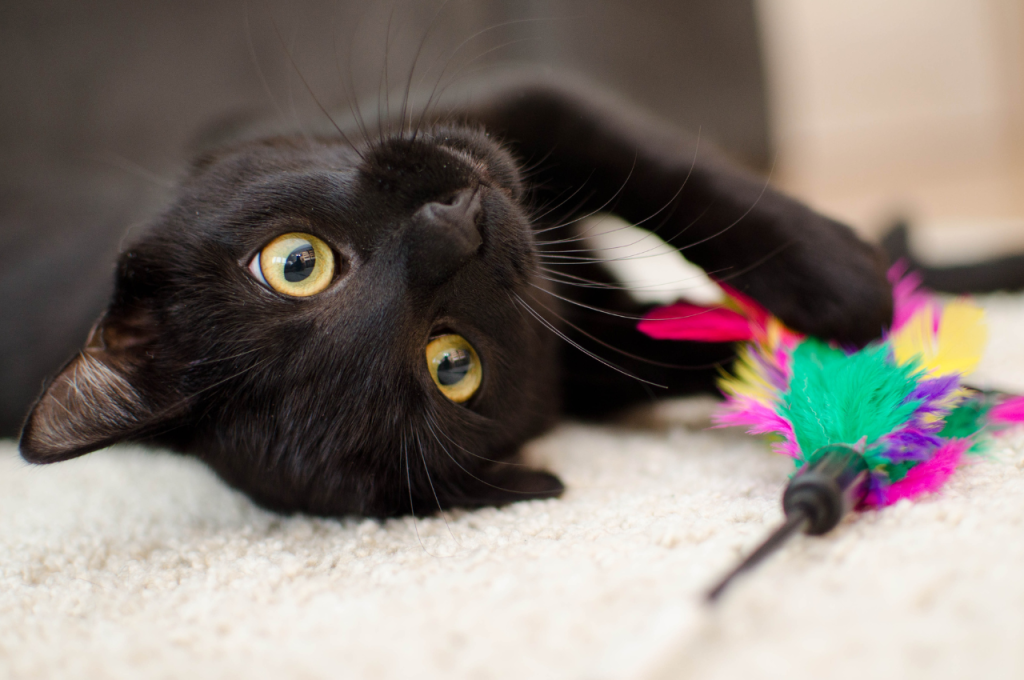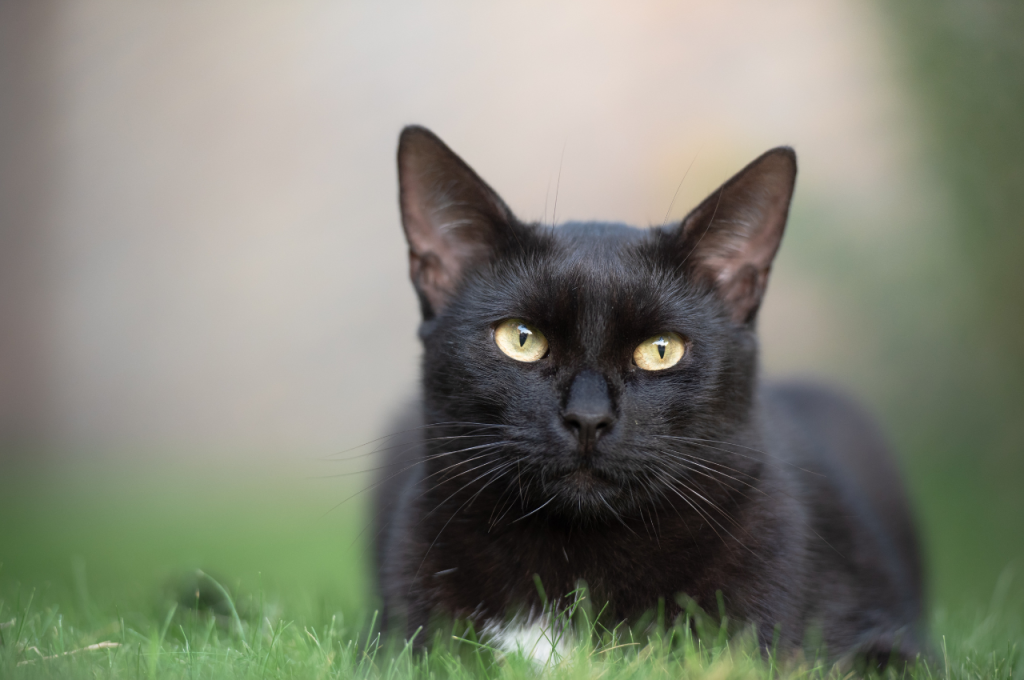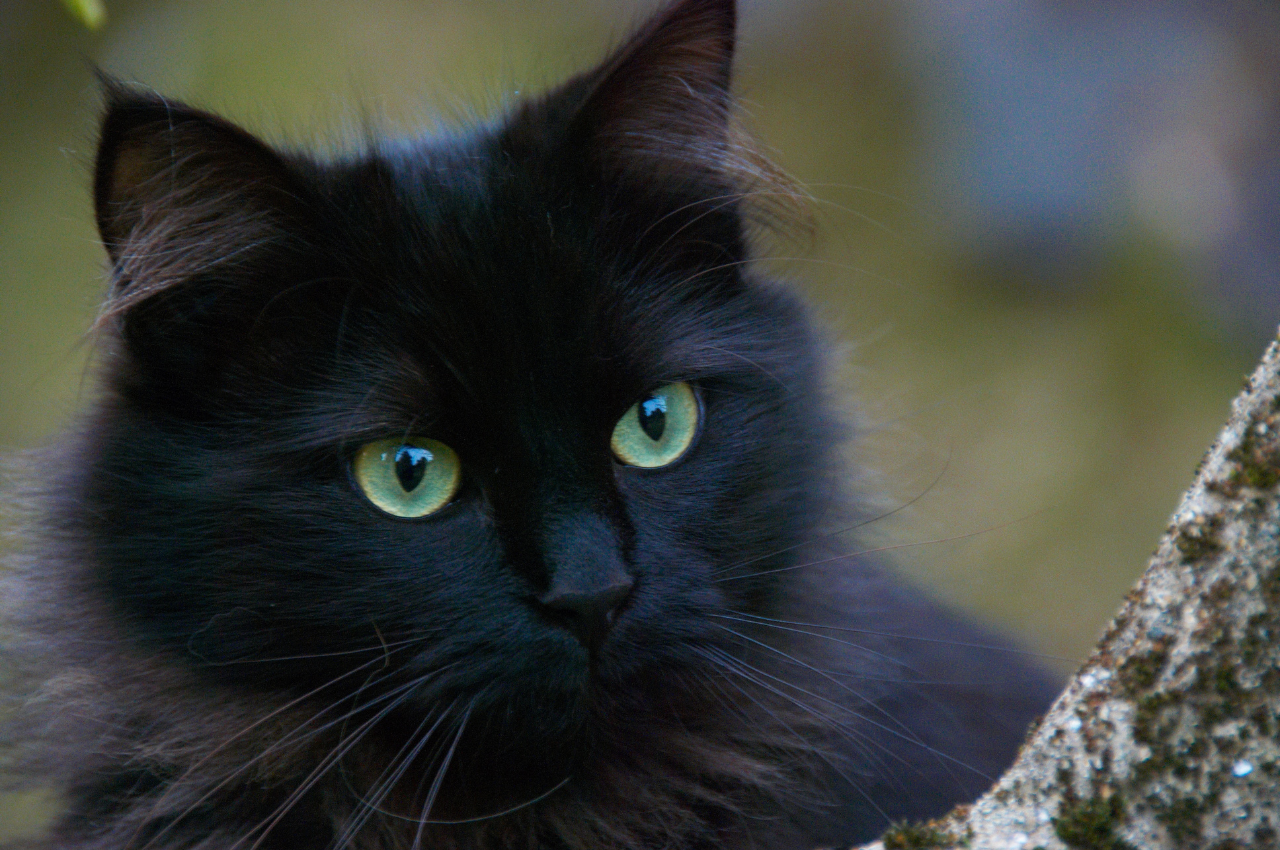Black cats are considered both good and bad luck symbols depending on cultural beliefs. In Western cultures, black cats are often associated with bad luck, superstitiously linked to witches and Halloween.
In contrast, many Eastern cultures view black cats as symbols of good luck and prosperity, bringing fortune to their owners. Beyond superstitions, black cats also have a rich history in folklore and mythology, holding various meanings. The ancient Egyptians revered black cats, believing they brought protection and good fortune.
In Japan, black cats are seen as symbols of prosperity and ward off evil spirits. Despite differing beliefs, one thing is certain: black cats have a mystique that captivates and intrigues people worldwide. Whether you see them as lucky or not, these sleek felines have left an indelible mark on human imagination and culture.
Origins of The Myth
Explore the origins of the myth surrounding black cats, tracing its roots from ancient civilizations to the superstitions of the Middle Ages. Black cats have long been steeped in folklore and superstitions around the world.

Superstitions and Folklore
In ancient Egypt, black cats were revered and considered good luck charms. They were believed to bring prosperity and protection to their owners.
However, in medieval Europe, black cats became associated with witchcraft and bad luck.
Associations with Witchcraft
During the witch hunts of the Middle Ages, black cats were linked to witches as their familiars. People believed that these cats helped witches cast spells and practice magic.
As a result, black cats were demonized and feared, leading to the superstition that they bring misfortune.
Cultural Beliefs and Symbolism
Throughout history, black cats have been associated with both good and bad luck in various cultural beliefs. In some cultures, they are considered a symbol of good fortune, while in others they are seen as an omen of misfortune. This contrasting symbolism highlights the diversity of cultural beliefs surrounding black cats.
Different Cultural Perspectives
Black cats have diverse interpretations across various cultures, with some viewing them as a symbol of fortune and others as a harbinger of bad luck. Let’s explore the contrasting beliefs about these enigmatic felines.
Positive Symbolism in Some Cultures
In some cultures, black cats are considered auspicious, bringing good luck and prosperity to those who encounter them. For instance, in Japanese folklore, these cats are believed to bring good fortune and ward off evil spirits. Similarly, in Scottish tradition, a black cat appearing on your doorstep is seen as a sign of prosperity.
Rows, Some cultures associate black cats with positive symbolism, In Japanese folklore, black cats are considered lucky, and Scottish tradition views black cats as bringers of prosperity. Unordered List – Japanese folklore depicts black cats as sources of good fortune. Scottish tradition sees black cats on doorsteps as auspicious signs ordered list:
1. Black cats have positive symbolism in certain cultures.
2. Japanese folklore regards them as lucky creatures.
3. Scottish tradition believes they bring prosperity.
Historical and Literary References
Throughout history, black cats have captivated the human imagination with their mystique and enchanting presence. Their association with luck, both good and bad, has been present in various ancient civilizations as well as in literary and artistic works. Let’s explore the intriguing historical and literary references surrounding these enigmatic creatures.
Black Cats in Ancient Civilizations
In ancient civilizations, black cats were often regarded as symbols of luck and protection. The Egyptians, for instance, revered these sleek felines and believed that they brought prosperity to their households. You might have heard of the goddess Bastet, who was often depicted as a lioness or as a woman with a lioness’s head. She was not only associated with fertility but was also believed to have the power to drive away evil spirits in her cat form. The Romans also held black cats in high esteem, considering them good fortune bearers.
Despite these positive beliefs, not all ancient civilizations viewed black cats in the same light. In Norse mythology, the goddess Freyja often traveled accompanied by two black cats. She was associated with both love and war, and her feline companions symbolized her connection to magic and witchcraft. As a result, black cats became associated with sorcery and were often feared. This fear of black cats as bringers of bad luck continued through the Middle Ages and beyond.
Black Cats in Literature and Art
The allure of black cats also found its way into the world of literature and art, where they played diverse and significant roles. In Shakespeare’s famous tragedy, Macbeth, the appearance of a black cat crossing the path of Lady Macbeth is seen as an omen of impending doom. This scene intensifies the suspense and foreshadows the tragic events that follow. Edgar Allan Poe, known for his dark and mysterious tales, includes black cats in his stories, underscoring their association with superstition and the supernatural.
In the realm of art, black cats have been featured in various famous paintings. One notable example is Théophile Steinlen’s Le Chat Noir, an iconic poster created for the cabaret of the same name in Paris during the late 19th century. The black cat in the poster symbolizes the bohemian atmosphere of the cabaret, as well as the artistic and spiritual elements associated with it.
Black Cat Adoption and Popularity
Black cat adoption and popularity have been the subject of much debate and superstition. Despite the stigma and misconceptions surrounding black cats, they make wonderful pets and companions. Understanding the challenges faced by black cats in adoption and the factors affecting their popularity sheds light on this topic.

Challenges Faced By Black Cats in Adoption
Black cats often face challenges in finding homes due to superstitions and myths associated with them. These misconceptions, fueled by folklore and media portrayal, contribute to their lower adoption rates. As a result, black cats are often overlooked in animal shelters, leading to longer waiting periods for adoption. Additionally, their dark fur may make them less photogenic in online adoption listings, further hindering their chances of being noticed.
Factors Affecting The Popularity of Black Cats
The popularity of black cats is influenced by various factors. One significant factor is the persistence of superstitions and negative beliefs surrounding black cats. Despite efforts to debunk these myths, they continue to affect the perception of black cats in society. This, in turn, impacts their adoption rates. Furthermore, the portrayal of black cats in popular culture, often as symbols of bad luck, perpetuates these beliefs. Educational initiatives and positive representation in the media play a crucial role in challenging these perceptions and increasing the popularity of black cats.
Scientific Explanations
Let’s delve into scientific explanations behind the age-old belief that black cats bring good luck. Although superstitions often lack scientific credence, uncovering the truth about black cats can shed light on this mysterious belief.
Melanistic Cats and Genetics
Melanism is the term used to describe the dark pigmentation in animals, resulting in black fur. For cats, this can occur due to a genetic mutation that causes an excess production of melanin, the pigment responsible for coloring. This trait is more prevalent in certain breeds, such as the Bombay cat, where the black coat is a result of specific genetic factors.
How Superstitions Spread
Superstitions surrounding black cats date back to ancient times and have been perpetuated through folklore and cultural beliefs. Historical events, such as the association of black cats with witchcraft in Europe during the Middle Ages, further embedded the superstition within society. These narratives continued to propagate through literature, art, and popular culture, influencing how black cats are perceived in different societies.
Real-life Experiences
Are black cats good luck? It’s a question that has intrigued people for centuries. While some may dismiss it as nothing more than a superstition, countless real-life experiences suggest otherwise. Personal stories from black cat owners and the effects of believing in the good luck myth shed light on the fascinating world of these mysterious felines.
Personal Stories of Black Cat Owners
Black cat owners often have heartwarming tales to share about their beloved pets. These stories dispel the myth that black cats bring bad luck and prove that they can be sources of immense joy and happiness. Here are just a few personal accounts that highlight their positive impact:
- Emily, a black cat owner from Texas, shares how her furry companion helped her through tough times. Whenever she was feeling down, her black cat would curl up in her lap, purring softly, providing comfort and soothing her troubled mind.
- Mike, a black cat owner from New York, couldn’t be more grateful for the presence of his furry friend. He recounts how his black cat, named Midnight, saved him from a potential house fire by persistently meowing and scratching at his bedroom door, alerting him to the danger.
- Julia, a black cat owner from California, fondly remembers the day she adopted her black cat, Shadow. Since then, Shadow has become an integral part of her family, bringing laughter and playfulness into their lives. Julia believes that Shadow’s presence has brought them good luck and positivity.
These personal stories demonstrate that black cats can be more than just pets; they can be true companions and protectors.
Effects of Believing in The Good Luck Myth
The belief in black cats being good luck has profound effects on those who embrace it. Whether it’s a subconscious shift in mindset or a deliberate choice to perceive these felines as symbols of positivity, the impact can be remarkable. Here are a few effects of believing in the good luck myth:
- Enhanced sense of optimism and positive energy: By associating black cats with good luck, individuals may find themselves approaching life with a more positive and hopeful attitude. This mindset can lead to increased optimism and a greater openness to new opportunities.
- Decreased fear and anxiety: Rather than cowering in fear when they cross paths with a black cat, believers in the good luck myth may feel a sense of calm and reassurance. This change in perception can alleviate anxiety and create a more relaxed state of mind.
- Strengthened relationships with pets: When owners view their black cats as bearers of good luck, it can deepen their bond and strengthen the relationship between humans and pets. This bond can lead to increased trust, affection, and overall well-being for both parties.
While the effects of believing in the good luck myth may vary from person to person, the overall impact seems to be overwhelmingly positive.
Debunking The Black Cat Superstition
Many people believe that black cats bring bad luck, but let’s explore logical explanations and myths and misunderstandings surrounding this superstition.
Logical Explanations for Misfortune
- Black cats blend into the night, not easily seen, potentially leading to accidents.
- Historically, black was associated with darkness and danger, contributing to superstitions.
- Deep-rooted fears and biases against black cats fueled these superstitions.
Myths and Misunderstandings
- Black cats have been linked to witchcraft in folklore, perpetuating negative beliefs.
- Superstitions about black cats vary globally, showcasing cultural influences.
- Modern society is slowly debunking these superstitions through education and awareness.
Promoting Black Cat Appreciation
Black cats have long been associated with superstitions and myths, but the truth is they are loving and unique pets just like any other. By raising awareness about black cat prejudice and supporting black cat rescues and shelters, we can help change the perception of these beautiful creatures.

Raising Awareness About Black Cat Stereotypes
- Highlight the positive traits of black cats.
- Dispelling myths and superstitions surrounding black cats.
- Encouraging the adoption of black cats.
Supporting Black Cat Rescues and Shelters
- Donate to black cat shelters.
- Volunteer your time to help care for black cats.
- Spread the word about the importance of black cat adoption.
Frequently Asked Questions on Are Black Cats Good Luck?
Certainly! Here are some frequently asked questions (FAQs) about black cats good luck:
Q. Are black cats really bad luck?
A. Some cultures view black cats as a symbol of good fortune, while others associate them with bad luck. Ultimately, it’s a matter of personal belief and superstition. In reality, black cats are just like any other cat, and their luckiness is a subjective interpretation.
Q. Do black cats bring good luck?
A. In many cultures, black cats are considered symbols of good luck. For example, in ancient Egypt, they were revered and thought to bring prosperity. However, superstitions vary around the world, so the belief that black cats bring good luck is subjective and not universal.
Q. Why are black cats associated with superstitions?
A. Historically, black cats have been associated with superstitions and negative beliefs. This association likely stems from cultural superstitions and folklore that have been perpetuated over time. However, it’s important to remember that these beliefs are not based on fact and should be viewed with skepticism.
Q. What is the history of black cats and luck?
A. Black cats have a long and varied history, with different cultures viewing them in different lights. Some ancient cultures revered black cats as symbols of luck and protection, while others associated them with bad omens. Understanding the history can provide insight into the diversity of beliefs surrounding black cats.
Conclusion
While the superstition of black cats being bad luck persists, many cultures and individuals view them as symbols of good fortune. From ancient Egypt to modern-day Japan, black cats are admired and revered. Ultimately, whether they bring luck or not is subjective, but their beauty and charm have made them beloved companions to many.
So, next time you encounter a black cat, don’t let superstitions cloud your judgment, as you might just be in the presence of a lucky charm.
